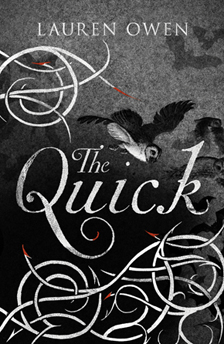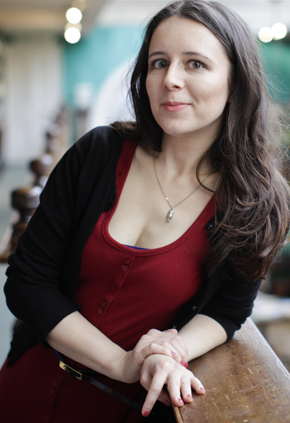Real writers
by Lauren OwenI began with a storm. Not my choice – I was seven, we were writing poems in class, and storms were our topic. I can’t remember writing anything creative before, and I didn’t know much about poetry. My poem began:
Thunder lightning crash
Stones and pebbles splash
I thought it would be brave
Not to slave at my prep
But open the door
And go down the step
I found that writing was fun – struggling for the right line, something that felt real, like it had been waiting there to be found. Then gotcha, down on the page it went. There were tricky moments – but these were like lumps in hot chocolate, they dissolved with enough attention. My teacher told me well done. Elated, I drew yellow lightning in the margin.
In my class we all admired the girl who could do gymnastics, the girl who got the best test marks, the girl who was extra-thin. Perhaps writing was the thing for me, like gymnastics and tests and thinness were for these other special girls.
But it took me a while to grasp the concept of being a writer. ‘Enid Blyton’ on a book cover meant about as much as ‘mint choc-chip’ did on an ice-cream wrapper – simply that I’d probably enjoy what was inside. I wasn’t interested in the fact that the novels originated with a real person – who cared, as long as there were plenty Famous Five books to read?
It was fiction that finally made me interested in authors as people. I loved Jo March from Little Women because she was a reader, and because she found such delight in making up stories. It’s an important, exciting thing, for a young reader to open a book and meet someone like them.
Later, I found Jo an encouragement. In spite of her talent she had to work hard to achieve her success as a writer. Her development as a writer is most interesting before she makes a name for herself – her struggles and false steps, her elation in every step she takes closer to her goal. I also took to Kate King, authoress in another of Louisa May Alcott’s novels, An Old-Fashioned Girl. Kate is a successful author, unlike Jo (at least to begin with) – but her life is evidently not an easy one. She looks “sick, tired, and too early old”, is mistrustful of her newfound fame, and has clearly had a long battle for the position she now enjoys. I was heartened by the idea of writing being something you work at, rather than books springing fully-formed from your mind without effort.
I developed an idea of the real writer – both an interest in the writer as a real person, and an ideal of what a real writer should be. I spent time looking up authors, putting lives and faces to the names on my book spines. I read interviews with living authors I admired. I analysed their lives for traces of greatness. Did you have to write for years before you became successful? Could you have another job? How many books should you write by the time you were thirty? None of the stories matched, and the real writers didn’t have much in common. It seemed odd that they could sit so placidly together on the library shelves.
The library was where the real writers lived – as a reader you were allowed into that house as a visitor. I loved stories of writers interacting – Bram Stoker meeting Oscar Wilde, the Brontë sisters reading their novels aloud to one another. It gave me an image of a privileged circle of fiction, which I might reach – perhaps, one day, if I was lucky.
One of my favourite writers was Jane Austen. After reading most of her adult novels, I discovered her juvenilia. To my mind, Austen was unassailably brilliant – I couldn’t imagine her struggling for clarity of phrase or thought. Her juvenilia didn’t change my impression – read in hindsight, it’s easy to see the wickedly gifted child-Austen mastering her art. But it did bring home to me that Jane Austen was once a teenager. Like Jo, she tried new things, she worked hard. And she had fun – the early writings crackle with energy, it’s easy to believe that the young Jane Austen took pleasure in perfecting her craft, and sharing her work with her family (to whom a number of pieces are dedicated).
Of course I didn’t think I could be Jane Austen. But I could have fun, like her. I imitated the style of her early pieces, which often feature bizarre or outrageous events – hungry children biting off their mother’s fingers, for instance. Writing meant the power to control characters’ fates, to create a fictional world with its own laws, values, and possibilities. Dizzying authority, especially for a teenager.
Sometimes that authority was usurped. When I was around fifteen, I discovered fanfiction – fan-written stories which used the characters from published works. Hosted mostly online, fanfiction introduced me to a world where I could share writing with others, and get feedback, advice on how to do better.
Fanfiction was also helpful because it was a hobby, there was no need to take it too seriously. I was wary of getting over-earnest and boring – thinking I was a real writer when I could barely finish a halting first novel. And with fanfiction there was no risk, no danger attached to failure.
This attitude only changed when, following my mother’s advice, I began a creative writing MA. For the first time, writing was work. Like Jo and Kate, I was toiling, things didn’t come easily. But I felt that I could discuss my work without apologising for mentioning it. My fellow students were dedicated, passionate, and ambitious. I felt that it was all right for me to be these things too.
Gradually – during my MA, and afterwards – I took apart my idea of the real writer. Now I think that if this state exists, it isn’t one that requires publication, or fulsome accolades, or an extensive body of work. Perhaps it’s simply having a love for the work. I have this, at least, in common with Jo, and the other authors whose lives I trawled through.
I often find myself back in a quiet room – not the classroom, but otherwise not vastly different to the room where I wrote my first poem. It’s still just me and the paper – still stirring at the hot chocolate lumps. If it’s not possible to be a real writer, perhaps it’s still possible to write something real.
 Lauren Owen grew up in the grounds of a boarding school in Yorkshire. Her first attempts at writing as a teenager were Harry Potter fanfiction. She is a graduate of St Hilda’s, Oxford, holds an MA in Victorian Literature, is completing a PhD on Gothic writing and fan culture, and is the recipient of the UEA creative-writing programme’s prestigious Curtis Brown Prize. Her first novel The Quick was described by the Independent as “suspenseful, gloriously atmospheric… and a feast of gothic storytelling that is impossible to resist.” It is published by Jonathan Cape.
Lauren Owen grew up in the grounds of a boarding school in Yorkshire. Her first attempts at writing as a teenager were Harry Potter fanfiction. She is a graduate of St Hilda’s, Oxford, holds an MA in Victorian Literature, is completing a PhD on Gothic writing and fan culture, and is the recipient of the UEA creative-writing programme’s prestigious Curtis Brown Prize. Her first novel The Quick was described by the Independent as “suspenseful, gloriously atmospheric… and a feast of gothic storytelling that is impossible to resist.” It is published by Jonathan Cape.
Read more


